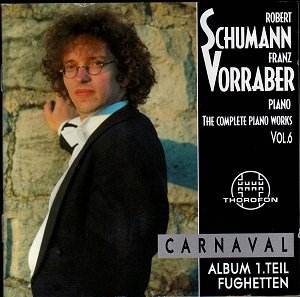Schumannís
Albüm Für die Jungend was inspired by his belief that
most music learned in piano lessons was worthless. The first pieces
in this Albüm were composed as a present to his eldest daughter
on her 7th birthday, but the idea soon mushroomed into
a set of 43 pieces in two parts, the first part of which opens
Vorraberís recital on this, the sixth in a thirteen compact disc
set of the complete works for solo piano by Robert Schumann.
Each
of the eighteen pieces Op.68/1 highlights a particular technical
aspect, but Schumannís poetic genius and love of cryptic allusion
is never far from the surface.
Franz
Vorraber respectfully rises to the technical challenge presented
in each successive miniature, but in his eagerness to underline
the poetic and deeper expressive qualities of the music, rubato
is occasionally less than judiciously employed. He does however
manage to achieve a compelling sense of continuity and purpose
and by the time he has concluded the entire set of pieces one
is unequivocally won over.
The
Fughetten Op.126 represent Schumannís earnest attempts at imbuing
the form with poetry, "where the silver thread of fantasy
ever entwines the chain of rule". Vorraberís studious
approach serves the seven Fughetten 0p.126 well, weaving a web
of considered intimacy and melancholy.
Vorraber
literally tears into the Carnival Op.9, which begins explosively
and with the utmost emotional exuberance. In its opening flourishes
he announces, without even the slightest hint of ambiguity, a
bold interpretation of Schumannís turbulent but eloquent articulation
of the paradox that besets the human spirit.
Carnival,
inspired by and composed during the Leipzig Carnival of 1835,
reflects the drama of real life, with its inevitable contradictions:
the exalted existing side by side with the lowly, albeit disguised.
Schumann himself wrote of his CarnivalÖÖ"I am aware that
my Carnival is provocative; the heart of an artist is sometimes
a strange thing, and the shrieking dissonances that life delivers
are softened by reconciling art, which often clothes pleasure
in long, dark veils, so that one may not see them openly."
Vorraber
reveals himself to be a pianist for the big occasion and Carnaval
benefits from a truly majestic interpretation.
Leon
Bosch
